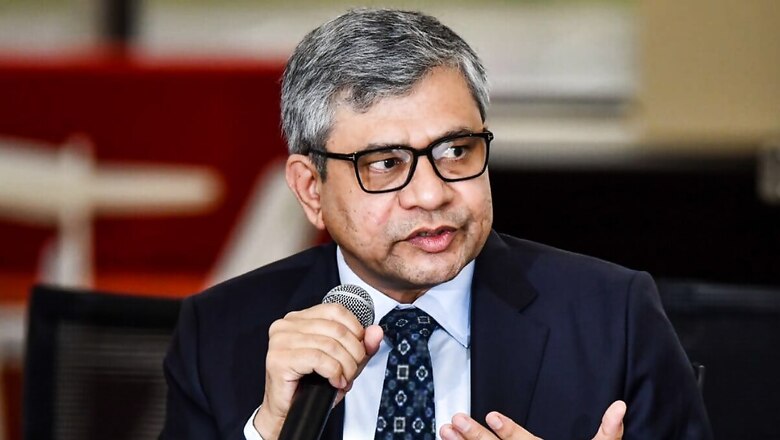
views
Union Minister Ashwini Vaishnaw, in an exclusive interview to CNN-News18, said that in the past nine years, Prime Minister Narendra Modi has “totally transformed the railways".
The Minister for Railways, Communications, Electronics and Information Technology said that Modi has shifted the Indian politics “from treating the poor as vote bank" to “a very committed, sincere, dedicated way of bringing the benefits to them".
Edited excerpts:
It has been nine years of the Modi government. One sector which has seen a visible change in these nine years is railways, be it the new railway stations or high-speed Vande Bharat trains. How do you see the arc of progress in the railways as the Minister in-charge?
In the past nine years, PM Narendra Modi ji has totally transformed the railways. You go to railway stations, they are spic and span, trains are running on time, all toilets have been converted into bio-toilets… There is a total transformative change in the railways. If you look at the previous 60 years, just about 30,000 km were electrified. In the past nine years, 40,000 km are being electrified. Nine years ago, 3.5-4 km new tracks were laid every day, the number is 14 km a day today, which is 5,000 km a year. In the last year, if we compare, the entire network of Switzerland has been added to the Indian Railways. That kind of change has happened. A total of 1,275 stations have been developed as world-class stations. Kawach world class safety system has been installed. Every aspect of a passenger’s journey is seeing a transformative change. Passengers give us this feedback. They realise what kind of change has happened in their lives.
The other ministry you deal with is Information Technology. It is said that the government needs to do more to try and control the impact of big techs we are seeing the world over and in India as well. A handful of big tech companies, multinational and transnational tech companies are reducing the power of the government and individual consumers. What does the government and ministry plan to do about it?
In fact, the entire world has realized — unlike many other countries where the big techs are dominant and they control every transaction — that India has actually created a new model of India stack, which is created by the Digital India initiative. In this model, no big tech is able to dominate any transaction. E.g., the payment system, a payment platform was created using public funds. Start-ups, industries, people… more than 300 million users have joined. Many start-ups are part of it, everybody is providing service and competing on the basis of quality of service. The world has acknowledged this kind of system officially in G20, G7 & SCO…all global fora and now Japan has also accepted the importance and power of the concept. They have agreed to adopt the UPI payment system. So our model is of democratising technology versus the other model in rich countries where technologies are in the hands of some dominant players.
Made in India #VandeBharat; ✅22 States/UTs✅18 Routes✅36 Train Services#9YearsOfSeva pic.twitter.com/HUKpn1hvSf— Ashwini Vaishnaw (@AshwiniVaishnaw) May 30, 2023
The opposition says amid the physical infrastructure and an upgrade in digital infrastructure development, the Modi government has failed the people of India on two issues — price rise and unemployment. The opposition also says that India, which was a vibrant democracy, is slipping into the territory of an electoral autocracy. How do you respond to that criticism?
Absolutely not, I don’t agree with this. Social infrastructure has also seen huge changes. Take the case of AIIMS, up to 2014, there were only seven AIIMS facilities, today, there are almost 20 AIIMS facilities. In every sector, be it education, healthcare, providing basic amenities to people in villages, people have seen a transformative change. The change has led to huge trust in PM Modi’s way of functioning. He has shifted the Indian politics from treating the poor as vote bank to a very committed, sincere, dedicated way of bringing the benefits to them.
Over the past 9 years, we have strived to uphold the dignity and enhance the livelihoods of India's poorest. Through numerous initiatives we have transformed millions of lives. Our mission continues – to uplift every citizen and fulfill their dreams. #9YearsOfSeva pic.twitter.com/FsydmGoAcf— Narendra Modi (@narendramodi) May 30, 2023
The opposition is saying the Karnataka results, where the Bharatiya Janata Party (BJP) lost badly and the Congress saw a big victory, are an example of the limitations of the ‘Modi Sarkar’ and ‘double engine government’. They are also saying that Karnataka was just the beginning and there will be similar results in Madhya Pradesh, Chhattisgarh and Rajasthan. You hail from Rajasthan, how do you counter that?
In Rajasthan, almost everybody has understood the deep level of corruption of the CM Ashok Gehlot-led Congress government. People have understood how the government is not able to do something as simple as conducting exams for jobs. There is a paper leak day after day. In contrast, if you look at the way the PM’s way of working… Railway recruitment, for example, saw more than 1 crore applicants, the exams happened in more than 300 cities, in more than 700 shifts in a flawless manner. There was not a single complaint of paper leak. That is the kind of thought process and delivery people want. People want absolutely clean governance. The Modi government demonstrated that first in Gujarat, during PM Modi ji’s tenure as the Chief Minister, and now at the national level. People understand this. People are looking at that as their future.




















Comments
0 comment